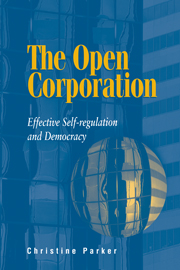Book contents
- Frontmatter
- Contents
- List of tables and figures
- Preface
- Acknowledgements
- 1 Introduction: Corporate self-regulation in the new regulatory State
- 2 The potential for self-regulation
- 3 Motivating top-management commitment to self-regulation
- 4 Cultivating self-regulation leadership
- 5 Self-regulation methodology and social harmony
- 6 The pathologies of self-regulation
- 7 Model corporate Citizens: The role of self-regulation Professionals
- 8 The three strategies of ‘permeability’ in the open Corporation
- 9 Meta-regulation: The regulation of self-regulation
- 10 Conclusion
- Appendix: Methodology
- Notes
- Reference
- Index
7 - Model corporate Citizens: The role of self-regulation Professionals
Published online by Cambridge University Press: 05 July 2014
- Frontmatter
- Contents
- List of tables and figures
- Preface
- Acknowledgements
- 1 Introduction: Corporate self-regulation in the new regulatory State
- 2 The potential for self-regulation
- 3 Motivating top-management commitment to self-regulation
- 4 Cultivating self-regulation leadership
- 5 Self-regulation methodology and social harmony
- 6 The pathologies of self-regulation
- 7 Model corporate Citizens: The role of self-regulation Professionals
- 8 The three strategies of ‘permeability’ in the open Corporation
- 9 Meta-regulation: The regulation of self-regulation
- 10 Conclusion
- Appendix: Methodology
- Notes
- Reference
- Index
Summary
In his ‘how-to’ book on compliance in financial Services in the UK, experienced compliance manager Andrew Newton poses the central dilemma that faces all compliance (and other self-regulation) staff:
[O]n the one hand, to work closely enough with the business it serves such that it understands and anticipates the needs of the business for compliant Solutions that take the business further, so contributing to the sense of common purpose and the development of the right culture; on the other hand to maintain sufficient independence and objectivity to recognize, where it is the case, that the most creatively formulated compliant solution may not be capable of accommodating the immediate desires of the business.
(Newton 1998: 91)There are at least two competing visions of the work of compliance functions in this passage, two different ideas of where the ultimate loyalty of self-regulation professionals lies (to employer, or to regulators and external social values), and two potential modus operandi for compliance work (a ‘harmonizing’ role and a ‘political’ role).
Both the new regulatory State, and corporate top management, will tend to abdicate responsibility for reconciling the practice of business with social and legal responsibility to self-regulation functions. This chapter argues that self-regulation staff should not absorb and deflect conflict. Rather, they should use conflict to facilitate self-criticism, internal deliberation about integrity, and internal-external dialogue with and consideration of ‘stakeholder’ views by internal players.
- Type
- Chapter
- Information
- The Open CorporationEffective Self-regulation and Democracy, pp. 168 - 196Publisher: Cambridge University PressPrint publication year: 2002



